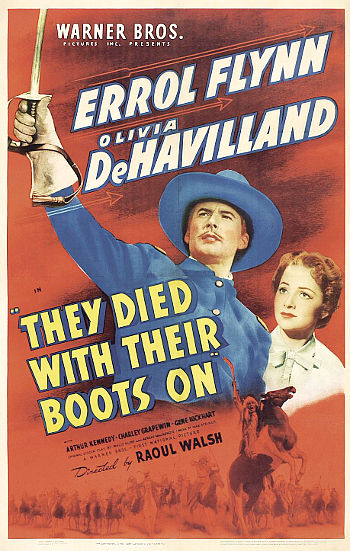 Errol Flynn is George Armstrong Custer in this tale of his life, from his days at West Point to The Battle of the Little Big Horn. The cadet shows up dressed like a general, displays little flair for bookwork or tactics, but excels in swordsmanship and horse riding. After all, he plans to ride to glory as a cavalry commander.
Errol Flynn is George Armstrong Custer in this tale of his life, from his days at West Point to The Battle of the Little Big Horn. The cadet shows up dressed like a general, displays little flair for bookwork or tactics, but excels in swordsmanship and horse riding. After all, he plans to ride to glory as a cavalry commander.
He’ll get his chance. He’s allowed to graduate early because the Union needs commanders. And a lunch of onions with Gen. Winfield Scott, head of the Union Army, earns him an appointment as a second lieutenant with the 2nd Cavalry Regiment.
He excels on the battlefield, of course. Off the battlefield, he courts Libby (Olivia de Havilland) and wins her hand. And when the Civil War ends, she’s instrumental in landing him a command out West, reminding her uncle Phil Sheridan of the debt the country owes its cavalry hero.
Once in the Dakotas, he finds an undisciplined 7th Cavalry that needs to be whipped into shape. And a worthy opponent in the Sioux and their chief, Crazy Horse. He beats them in battle, too. But no more than he’s secured a peace, profiteers start spreading rumors of gold in the Black Hills.
And so Custer rides off in search of glory once more, this time to save the lives of all the whites who been lured into Indian territory with promises of gold that isn’t there.
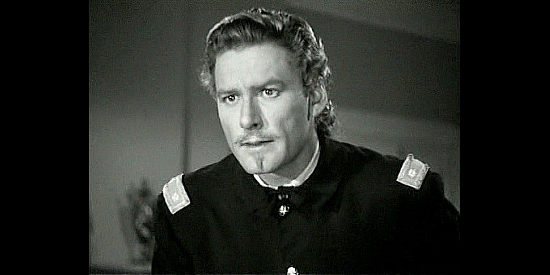
Errol Flynn as George Armstrong Custer, demanding a return to command in They Died With Their Boots On (1941)
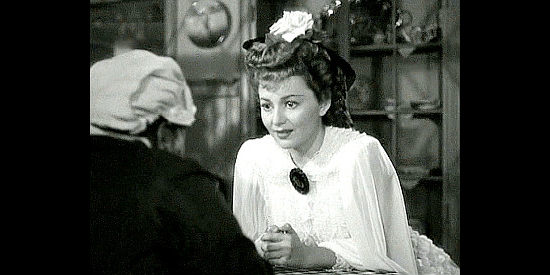
Olivia de Havilland as Elizabeth Bacon, waiting for her maid to read her fortune in They Died with Their Boots On (1941)
The film plays fast and loose with history. Heck, you could fill a page with all the inaccuracies in this version of the Custer legend. For instance, Custer is mistakenly promoted to brigadier general, according to the film. The mistake turns into good fortune for the Union Army, when Custer leads one daring attack after another, turning back J.E.B. Stuart’s forces at Hanover!
But Flynn’s swashbuckling swagger is perfect for the role of the controversial cavalry commander. No one else has come close to playing his as well. And Raoul Walsh serves up an entertaining film that never seems to drag in spite of a running time of 140 minutes.
Full of delightful scenes, like when Custer is walking guard duty and is prohibited from talking to Libby, like when Libby pretends to love onions, like when Custer discovers Libby’s dad is the man he offended earlier in the day at a bar.
When Walsh turns from humor to action, there’s plenty of it, with a fine rendition of the Battle of the Little Big Horn, in which Custer is the last man standing. Another inaccuracy, most like, but it all makes for one heck of a film.
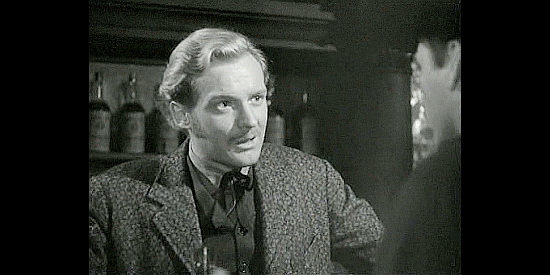
Arthur Kennedy as Ned Sharp, bracing for a showdown with Custer in They Died with Their Boots On (1941)
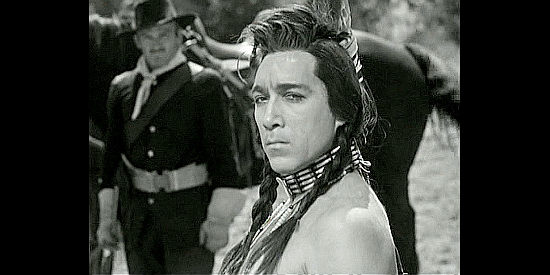
Anthony Quinn as Crazy Horse, meeting George Custer for the first time in They Died with Their Boots On (1941)
Directed by:
Raoul Walsh
Cast:
Errol Flynn … Col. George Custer
Olivia de Havilland … Libby
Arthur Kennedy … Ned Sharp
Charley Grapewin … California Joe
Gene Lockhart … Samuel Bacon
Anthony Quinn … Crazy Horse
Stanley Ridges … Maj. Taipe
John Litel … Gen. Sheridan
Sydney Greenstreet … Gen. Scott
Walter Hampden … William Sharp
Regis Toomey … Fitzhugh Lee
Hattie McDaniel … Callie
G.P. Huntley … Lt. “Queen’s Own” Butler
Frank Wilcox … Capt. Webb
Joe Sawyer … Sgt. Doolittle
Minor Watson … Sen. Smith
Runtime: 140 min.
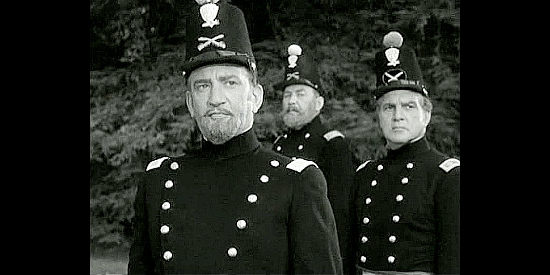
John Litel as Gen. Phil Sheridan, watching West Point cadets depart to fight for the South in They Died with Their Boots On (1941)
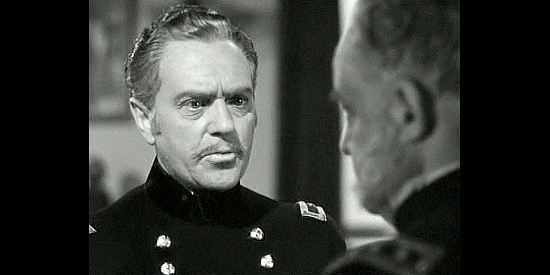
Stanley Ridges as Maj. Romulus Taipe, the West Point instructor who holds a grudge against Custer in They Died with Their Boots On (1941)
Memorable lines:
Ned Sharp: “What made you want to be Army by choosing it as a career?”
Cadet George Custer: “Glory, Mr. Sharp, glory. I want to leave a name behind me that the nation will honor. There are a great many more statues for soldiers than civilians, I’ve noticed.”
Custer to his future father-in-law: “Why you fat little pipsqueak. This gentleman’s a soldier, sir. He stands up in battle and gets shot at so that sanctimonious little skinflints like you can run around town in safety and do business as usual. And if he wants to get drunk on leave, what business is it of yours?”
Callie, the maid, to Libby when she orders up a plate of spring onions for her and Custer: “I know what you love, and it ain’t onions.”
Maid: “Libby’s in her room, locked in.”
Custer: “Why that ugly old fossil. He can’t do that to her.”
Maid: “That’s what she yelled as he turned that lock. They had a difference of opinion about you. Now she’s upstairs with her opinion and he’s downstairs with his.”
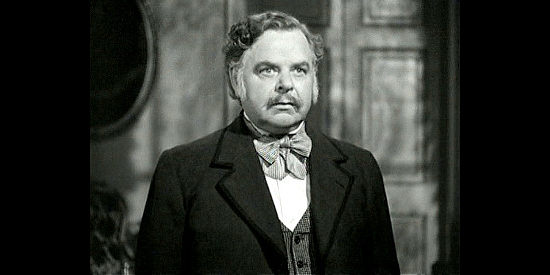
Gene Lockhart as Samuel Bacon, Libby’s father, at odds with George Armstrong Custer in They Died with Their Boots On (1941)
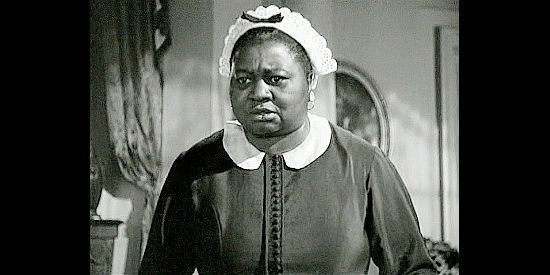
Hattie McDaniel as Callie, Elizabeth Bacon’s maid, surprised by her interest in onions in They Died with Their Boots On (1941)
Winfield Scott: “Well, who is he (Custer)?”
Maj. Tate: “Heaven help us, sir. The Michigan cavalry is in the hands of the most irresponsible, incompetent, rattle-brained second lieutenant in the Union Army.”
Custer: “The greater the odds, the greater the glory.”
Sharp: “Here’s to money. And long may she jingle.”
Custer: “You may be right about money, Sharp. Quite right. But there’s one thing to be said for glory.”
Sharp: “What’s that?”
Custer: “You can take glory with you, when it’s your time to go.”
Sharp: “Where’s the regiment riding?”
Custer: “To hell, Sharp. Or to glory. It depends on one’s point of view.”
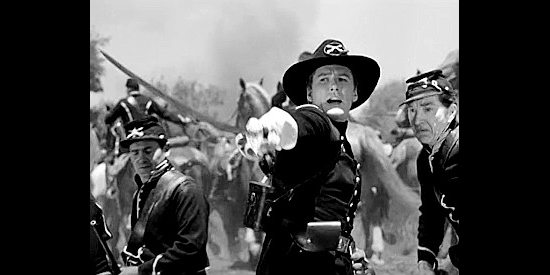
Errol Flynn as George Armonstrong Custer, leading a charge during the Civil War in They Died with Their Boots On (1941)
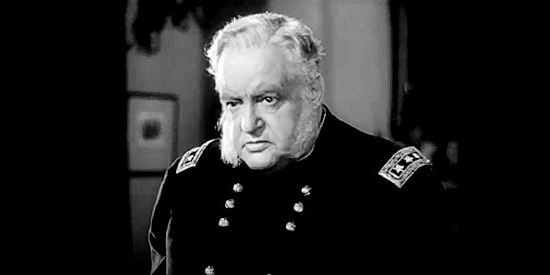
Sydney Greenstreet as Lt. Gen. Winfield Scott, getting reports from Gettysburg in They Died with Their Boots On (1941)
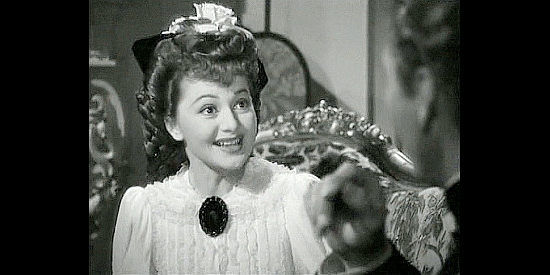
Olivia de Havilland as Elizabeth Bacon, being courted by Custer in They Died with Their Boots On (1941)
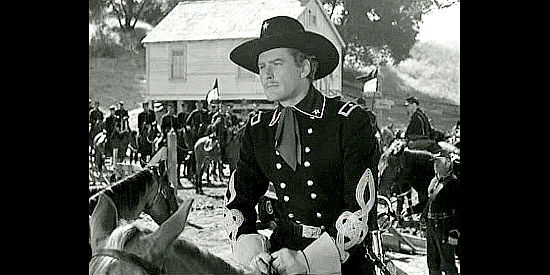
Erol Flynn as George Armstrong Custer, covered in gold braid and ready to command the Michigan cavalry in They Died with Their Boots On (1941)
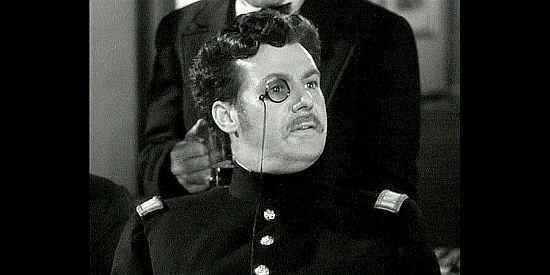
G.P. Huntley as Lt. Queens Own Butler, introducing Custer to Garry Owen in They Died with Their Boots On (1941)
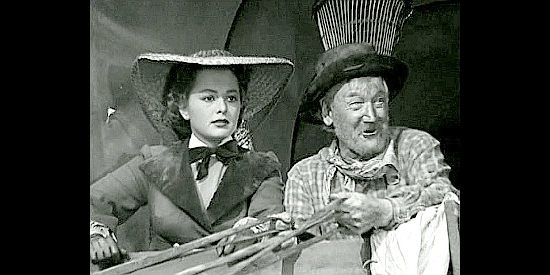
Olivia de Havilland as Elizabeth Bacon,arriving at a post out West with California Joe (Charley Grapewin) in They Died With Their Boots On (1941)
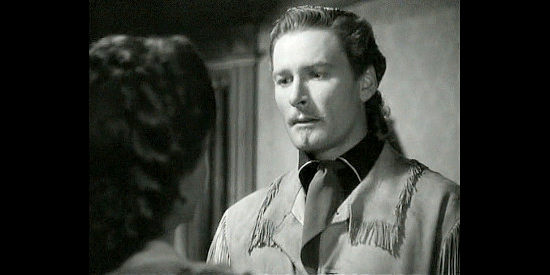
Errol Flynn as George Armstrong Custer, bidding farewell to Libby at the start of the Little Bighorn campaign in They Died with Their Boots On (1941)
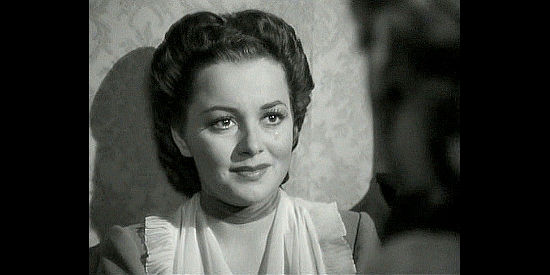
Olivia de Havilland as Elizabeth Custer, tears in her eyes as she says goodbye to her husband in They Died with Their Boots On (1941)
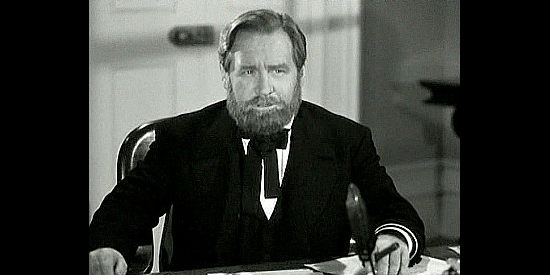
Joseph Crehan as President Grant, hearing George Armstrong Custer’s demands in They Died with Their Boots On (1941)
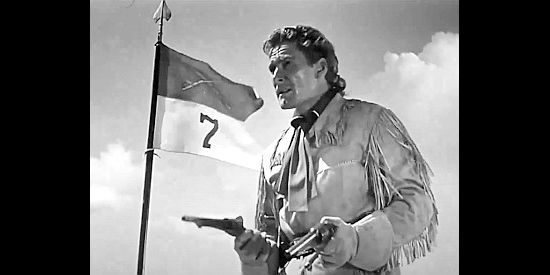
Errol Flynn as George Armstrong Custer, out of ammunition as the Sioux approach in They Died with Their Boots On (1941)

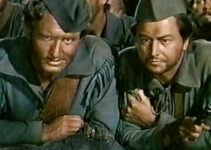
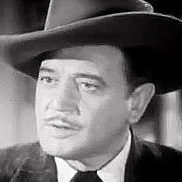
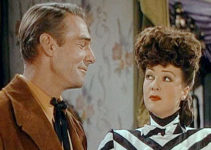
As a Custer buff, I really love this film. If you are looking for a good film about Custer’s Last Stand that is pretty accurate (even it has a good many errors, but there are none better out there at this time) I suggest “Custer’s Strategy of Defeat”. Its about 80-85 % accurate and authentic. Attached are links to view or purchase the film.
https://www.historyfix.com/videos/custer-s-strategy-of-defeat-cc-2023-5-1-final-cut-002
https://aviationpicturesimtp.com/custers-strategy-of-defeat/
The trailer: https://youtu.be/NTJmzzy3fvA?si=-nXJZKm3gGxXCfTu